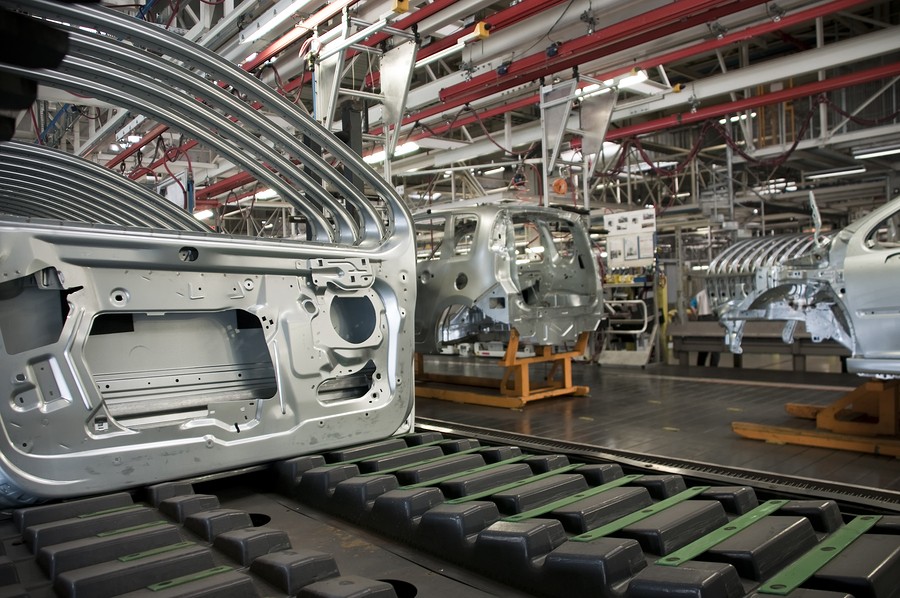A Manufacturing Shift Is Underway in the Automotive Sector

It seems like automakers are always in the news — usually not for good reasons! This time, however, the headlines are positive as several of the world’s largest manufacturers announce major reinvestments in production. Specifically, GM, Ford, Honda, and Toyota are plunging big budgets into new manufacturing facilities and practices. With these investments comes a push toward future manufacturing trends.
Breaking down the news
2018 was a tough year for the automotive industry. Global economic issues from trade tensions battered down sales and ate into margins. Scandals like Volkswagen’s emissions falsifications have had rippling effects on the industry at large. Ballooning consumer auto debt has dramatically slowed the sale of new vehicles. There are a few headwinds, to say the least.
But, miraculously, 2019 is looking up for auto manufacturers. As the issues from 2018 come into the rearview mirror, they’re being replaced by positive action from automakers, centered on manufacturing.
A reinvestment in manufacturing
In the face of current and potential headwinds, automakers are getting proactive. Trade tariffs have forced automotive manufacturers to explore supply chain optimization, and now the focus is on improving manufacturing to meet upcoming initiatives.
At General Motors (NYSE:GM), focus is on smarter manufacturing for its crossover vehicles. The company announced plans to spend $36 million at its assembly plant in Lansing, Michigan, and $20 million at its propulsion plant in Romulus, Michigan, upgrading automation, production capabilities, and efficient operations.
GM’s counterpart Ford (NYSE:F) is also hitching its wagon to manufacturing improvements as a way to regain its foothold in a rocky marketplace. Ford is committing $1 billion to its Chicago assembly plants, adding 500 new jobs to support a vision of bringing new electric vehicles to market in the coming five years. Ford’s approach includes investment in automation and efficiency upgrades but also has more than $40 million earmarked for employee-focused improvements, for things like break areas and security improvements.

A reason to improve manufacturing standards
GM and Ford may be preparing for a shift in their cyclical market, but their reinvestment in manufacturing isn’t purely driven by economic headwinds. Competition is also at play.
Earlier this year, Toyota and Honda both announced great results from their North American manufacturing plants. In 2018, Toyota produced nearly 2 million vehicles. Honda saw production increases of 2.7%, resulting in the production of 1.24 million vehicles last year. And they’re not done yet! Both companies have announced huge commitments to their North American manufacturing divisions: Toyota committing $374 million in 2017 to a five-year plant improvement plan and Honda investing $5.9 billion over the past five years.
There’s always been a clash of titans in the auto industry. And while innovation has always been a key driver, new investments suggest that the competitive edge of tomorrow rests with new-age manufacturing technologies.
The future of auto manufacturing
There’s uncertainty about where the automotive market will be in five years — but there are key trends to observe. Predictions about electric vehicles, rising popularity of SUVs, progress in emerging markets, and more all shape a picture with unique manufacturing demands. And, based on recent news, it appears automakers have already realized these demands. Massive investments in manufacturing point to more than new trends — they herald newer ways to produce better products.
Is your plant getting ready to bring in new equipment or change manufacturing practices? Don’t forget to support changes with proper machine maintenance schedules. You can always count on the professionals at Global Electronic Services. Contact us for all your industrial electronic, servo motor, AC and DC motor, hydraulic, and pneumatic needs — and don’t forget to like and follow us on Facebook!
- auto manufacturing
- Automotive Manufacturing
- north american manufacturin